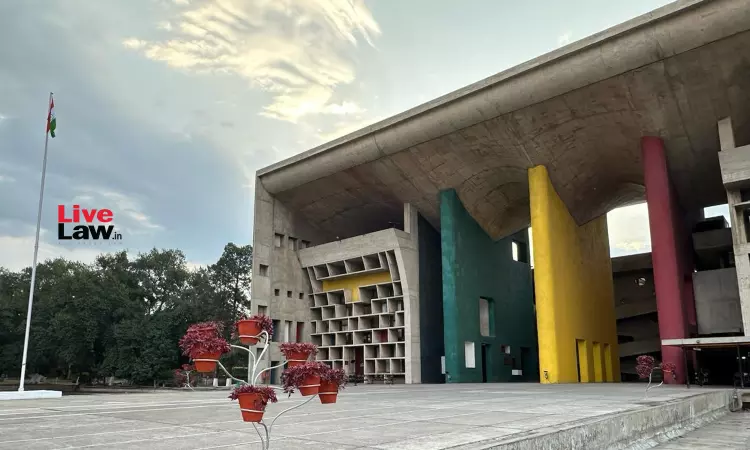- Home
- /
- High Courts
- /
- Punjab and Haryana High Court
- /
- Punjab Civil Service Rules |...
Punjab Civil Service Rules | Specially Abled Daughter Can't Be Denied Family Pension Because She Got Married: High Court Imposes Cost
Aiman J. Chishti
21 May 2025 7:34 PM IST
The Punjab & Haryana High Court has imposed a cost of Rs.25,000 on Union Territory of Chandigarh for mechanically rejecting a specially-abled daughter's claim for family pension.Justice Sanjeev Prakash Sharma and Justice H.S Grewal said, “We find that the approach adopted by the petitioners in denying family pension to a specially-abled daughter, who was unmarried at the time of...
The Punjab & Haryana High Court has imposed a cost of Rs.25,000 on Union Territory of Chandigarh for mechanically rejecting a specially-abled daughter's claim for family pension.
Justice Sanjeev Prakash Sharma and Justice H.S Grewal said, “We find that the approach adopted by the petitioners in denying family pension to a specially-abled daughter, who was unmarried at the time of her father's retirement, was against the rules. As per Clause 4 and the proviso thereto of Rule 6.17 of the Punjab Civil Services Rules, if the son or daughter of a government servant is suffering from any mental disorder or is physically crippled or disabled to the extent that he or she is unable to earn a livelihood, the family pension shall be admissible to him or her even after becoming otherwise ineligible for it, irrespective of marriage.”
Speaking for the bench Justice Sharma said, “Merely because she got married would make no difference. We further deprecate the approach adopted by the Union of India in challenging the proceedings before this Court with regard to a specially-abled person who has no source of earning and was unmarried at the time of death of his father.”
The Court also clarified that as per Punjab Civil Services Rules (PCS Rules) the earnings of specially-abled daughter's husband cannot be said to be the earnings of the family for denying her family pension.
These observations were made while hearing the plea filed by UT wherein it challenged the order passed by the Central Administrative Tribunal (CAT) whereby claim of a specially-abled daughter for family pension was allowed.
Facts in Brief
Surinder Pal, father of respondent Poonam, retired in 1999 and passed away in 2014. His specially-abled daughter, Poonam, being the only surviving legal heir after her mother's death in 2012, applied for family pension. However, the pension was not granted. Authorities asked her to provide a disability certificate, legal heir certificate, and income certificate. She submitted the required documents to the Sub-Divisional Magistrate, UT Chandigarh, but her claim was rejected in 2015 on the grounds that a married daughter is not eligible for family pension under Rule 6.17(4)(V)(b) of the Punjab Civil Service Rules, Volume-II.
However in 2018, the CAT set aside the order and directed to reconsider her claim.
Counsel appearing for the UT Chandigarh, submitted that the as per Rule 6.17 (IV) Explanation (2) respondent would not fall in the eligibility zone for receiving family pension as the monthly income limit was higher than Rs. 3,500 plus dearness allowance.
It was further submitted that respondent has nowhere submitted her disability certificate and on that count also disability pension could not be released.
After hearing the submissions, the Court rejecting the submissions of UT noted that the daughter soon after the death of her father, filed an application mentioning that she was specially-abled, therefore, claimed family pension on the basis of relevant rules.
“It was specified that at the time of retirement of her father she was not married but is now married. As per instructions dated 09.12.2015 in case the daughter is suffering from any disability which prevents her from earning livelihood, she would continue to get family pension even after the age of 25 years, irrespective of her marriage,” the Court added.
Justice Sharma referring to PCS Rules highlighted that, daughters, irrespective of their marriage upto the age of 25 years, would be entitled to family pension and those daughters, who were suffering from any disability, would continue to get family pension even after the age of 25 years, even if she has got married.
The bench opined that the income of the husband is not to be counted for the purpose of grant of family pension to a daughter who is above 25 years of age.
While upholding the CAT's order the Court directed that, “Family pension to the applicant/ respondent no.1, if not released, shall be released with interest @ 9% on arrears. She is also held entitled for cost of ` 25,000.”
Mr. Abhinav Sood, Advocate, for petitioner nos. 1, 3 and 4. Mr. H. S. Jugait, Advocate, for petitioner no. 2.
Ms. Veena Kumari, Advocate, for respondent no.1.
Title: State of U. T. Chandigarh and others v. Poonam and others
Click here to read/download the order



